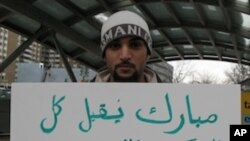Egyptians and other Arab nationals are also protesting in Washington on Saturday, showing their solidarity with the protesters in Egypt as well as seeking more U.S. pressure on President Hosni Mubarak.
An Egyptian, who gave only his first name Ahmed, was one of several dozen protesters who demonstrated near the Egyptian embassy in Washington on a cold and cloudy day.
He read one of the many signs he was carrying. "It says dignity, freedom and social justice is all we demand. It's time to leave (Mr.) Mubarak," he said.
The Washington protester said he believes any reforms or new government Mr. Mubarak leads will amount to the same old broken promises. "We do not want his reforms. We just want him out. We want the whole parliament out. We want to change the whole system. It is about time. Thirty-three years now," he said. "It is enough. Don't you think?"
He also said he had not been able to reach his family in Egypt on the phone or on the Internet since the protests began there on Tuesday.
An Egyptian-American who also only gave her first name, Chereen, says she believes the U..S. administration needs to do more, and understand that President Mubarak is only interested in keeping power.
She said U.S. officials should not be afraid to have a new government in Egypt, even though Mr. Mubarak has been a long-time U.S ally in the volatile Middle East, currently dominated by autocratic rulers. "Obviously Egypt is very important politically over there and the United States has lots to do with what happens in Egypt so it is important to protest here and show solidarity with people in Egypt," she said.
A Saudi national, Menyar al-Mufti, who spent part of his childhood in Egypt, says after Tunisia, in nearby north Africa, where a popular revolt recently ousted another longtime president, this is clearly a decisive moment in the greater region's history.
"I am pretty sure that whichever country where people are oppressed they will definitely revolt. Maybe this is just the start up of everything to come in the future, the beginning of the end I guess you could also say," he said.
The protesters then prepared new placards as they waited for buses and the metro to take them to another protest at the White House.




